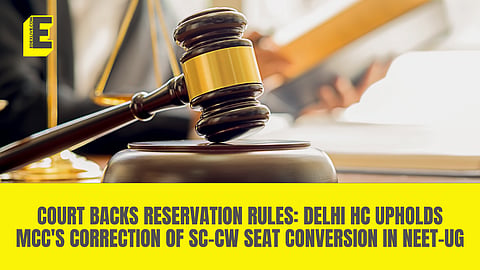

The Delhi High Court (HC) has dismissed a petition challenging the Medical Counselling Committee's (MCC) decision to modify its seat conversion algorithm during NEET-UG 2024-25 counselling, in a ruling that prioritises constitutional reservation principles over administrative predictability.
According to LiveLaw, the case involved petitioners eligible for Armed Forces quota who sought admission to MBBS courses in Delhi University but were denied seats after MCC changed how unfilled reserved seats would be redistributed.
Justice Dinesh Kumar Sharma found no illegality in MCC's actions, stating that "The correction of an unintentional legal error prior to the counselling process cannot be construed as a procedural breach or administrative fault. Petitioners have failed to demonstrate the exceptional circumstances required for intervention."
Originally, the Information Bulletin stipulated that Scheduled Castes-Children/Women's (SC-CW) seats would convert to Unreserved-Children/Women's (UR-CW) seats in the third counselling round.
However, before this round began, MCC revised the algorithm, directing that unfilled ST-CW and SC-CW seats would revert to their parent ST and SC categories instead of converting to UR-CW. The authorities justified this change as necessary to align with constitutional mandates and Supreme Court precedents on reservation.
The petitioners contended they were eligible for seats under the CW category but were denied allocation even after the third round results. They argued this constituted a ‘serious error’ in implementing the published Information Bulletin. MCC countered that the change was announced before the third round commenced and that no UR-CW seats remained vacant, making it impossible to accommodate the petitioners regardless.
The National Medical Council supported MCC's position, explaining that "upon legal scrutiny, the initial conversion mechanism was found to be inconsistent with constitutional reservation principles" and therefore required modification.
In its analysis, the court emphasised that when horizontal reserved category seats remain unfilled after two counselling rounds, constitutional principles and Supreme Court directives require proper redistribution – specifically that CW reserved seats must revert to their parent categories (ST-CW to main ST, SC-CW to main SC, OBC-CW to main OBC, and UR-CW to main UR).
Justice Sharma outlined four conditions necessary for judicial intervention in reservation cases: no fault attributable to the candidate, expeditious pursuit of legal remedies, demonstrable fault by authorities with clear rule violations, and proven superior merit compared to admitted candidates. The Clcourt found the petitioners failed to meet these standards.
"Therefore, the legal infirmity in the CW Conversion Algorithm, which was inconsistent with the Constitution of India and Supreme Court rulings, was rightly rectified in accordance with Article 16(4), Article 141, and Article 144 of the Constitution of India," Justice Sharma ruled.
"This rectification cannot be considered a post facto change in the rules of the game, as it was merely a correction made before the third round of counselling to ensure compliance with the law,” the justice said.
The court distinguished this case from the recent Yashika Malik judgment (Yashika Malik v University of Delhi Faculty of Medical Sciences & Ors (2024)), where Delhi University was directed to create a supernumerary seat for a CW category candidate.
Justice Sharma noted: "The current Petitioners, however, stand in a fundamentally different position. The Petitioners have failed to demonstrate any administrative mistake or procedural irregularity that prevented their participation in counselling. The Petitioners have not been barred due to documentation issues."
The judgment also highlighted that the Information Bulletin explicitly grants MCC discretion to make necessary changes whenever required, stating: "Additionally, if there is any ambiguity or confusion regarding eligibility criteria, counselling procedures, or candidate registration, the interpretation given by MCC and DGHS shall be final and binding."
This clause, the court noted, ensures authorities maintain flexibility to modify rules when necessary for proper policy implementation.
With these observations, Justice Sharma dismissed the petition (WP(C) 14708/2024, Avika Shahi And Anr vs. Medical Counselling Committee And Ors), reinforcing judicial reluctance to interfere in administrative decisions on reservation matters absent clear procedural violations.
